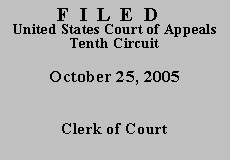

| CRAIG MELON DAVIS, |
|
| v. | |
| STEVEN BECK, Warden,
Respondent-Appellee. |
|
Before EBEL, McKAY, and HENRY, Circuit Judges.
Craig Melon Davis, a state prisoner proceeding pro se, seeks a certificate of appealability ("COA") to appeal the denial of his 28 U.S.C. § 2254 petition for habeas corpus. We deny his request for a COA, deny his request to proceed in forma pauperis, and dismiss his appeal.
I. BACKGROUND
In 2001, a jury found Mr. Davis guilty of distributing methamphetamine, a controlled substance. He appealed, and the Oklahoma Court of Criminal Appeals ("OCCA") affirmed. He then sought and was denied post-conviction relief in Oklahoma district court and before the OCCA.
Mr. Davis then filed a 28 U.S.C. § 2254 petition for a writ of habeas corpus in federal district court in 2004, alleging several grounds: (1) improper admission of other crimes evidence; (2) ineffective assistance of trial and appellate counsel; (3) erroneous jury instructions regarding prior convictions; (4) improper sentence enhancement; (5) denial of equal protection and due process; (6) insufficient evidence; and (7) denial of due process and equal protection in state post-conviction proceedings. In a thorough report and recommendation, the magistrate judge recommended denial of the petition. In his objections to the report and recommendation, Mr. Davis maintained that the magistrate judge misapplied Oklahoma's rules of procedural default. He contended that the State of Oklahoma has defaulted on its own procedural rules, and thus such rules could not apply to Mr Davis. The district court adopted the magistrate judge's report and recommendation and denied Mr. Davis's application for a COA.
Before this court, Mr. Davis only argues that the district court erroneously applied a non-existent state procedural bar to his claims. He also argues, in addition and in the alternative, the Oklahoma's state procedural bar is not adequate or independent.
II. DISCUSSION
Issuance of a COA is jurisdictional. Miller-El v. Cockrell, 537 U.S. 322, 336 (2003). A COA may issue "only if the applicant has made a substantial showing of the denial of a constitutional right." 28 U.S.C. § 2253(c)(2). "A petitioner satisfies this standard by demonstrating that jurists of reason could disagree with the district court's resolution of his constitutional claims or that jurists could conclude the issues presented are adequate to deserve encouragement to proceed further." Miller-El, 537 U.S. at 327. "The COA determination under § 2253(c) requires an overview of the claims in the habeas petition and a general assessment of their merits." Id. at 336. "This threshold inquiry does not require full consideration of the factual or legal bases adduced in support of the claims. In fact, the statute forbids it." Id. While Mr. Davis is not required to prove the merits of his case in applying for a COA, he must nevertheless demonstrate "something more than the absence of frivolity or the existence of mere good faith on his or her part." Id. at 338 (internal quotation marks omitted).
Mr. Davis contends that, because of procedural irregularities in the state post-conviction proceedings, his challenges should not be dismissed. Specifically, he contends that the state district court did not provide him with adequate findings and conclusions of law, as required pursuant to Okla. Stat. Ann. tit. 22 § 1083(c) ("An order disposing of an application without a hearing shall state the court's findings and conclusions regarding the issues presented."). We agree with the magistrate judge that Mr. Davis's claim is "not cognizable as grounds for a writ of habeas corpus" because Mr. Davis has not demonstrated that the state procedural error has violated his due process rights. Rec. doc. 19, at 15 (Mag. Judge's Report and Recommendation, filed Nov. 24, 2004). See Shipley v. Oklahoma, 313 F.3d 1249, 1251 (10th Cir. 2002) (holding that where a state trial court erred in failing to provide adequate written conclusions of law in its order denying petitioner's application for post-conviction relief, "[f]ederal habeas review does not extend to the correction of purely state law procedural errors that do not rise to the level of a constitutional due process violation") (internal quotation marks omitted)..
We have carefully reviewed Mr. Davis's brief, the district court's disposition, the magistrate judge's report and recommendation, and the record on appeal. Nothing in the facts, the record on appeal, or Mr. Davis's brief raises an issue which meets our standards for the grant of a certificate of appealability. For substantially the same reasons as set forth by the district court's order adopting the magistrate judge's report and recommendation, we cannot say "that reasonable jurists could debate whether (or, for that matter, agree that) the petition should have been resolved in a different manner." Slack v. McDaniel, 529 U.S. 473, 484 (2000) (quotation marks omitted).
III. CONCLUSION
We therefore DENY a COA and DISMISS his appeal.
Entered for the Court,
Robert H. Henry
Circuit Judge